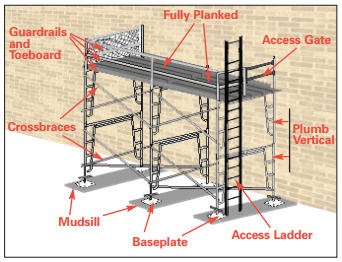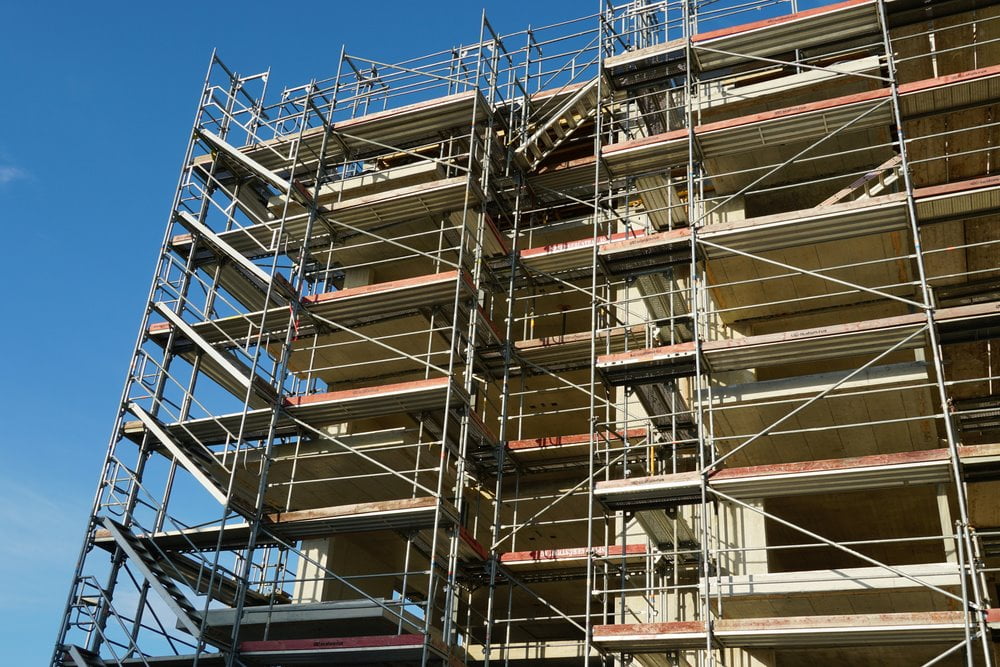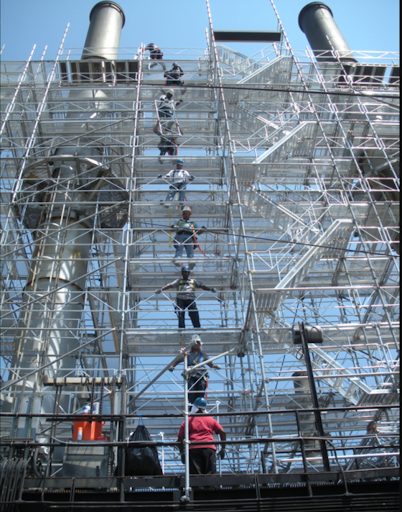Affordable and Professional Scaffolding Cobham Services Available Now
Affordable and Professional Scaffolding Cobham Services Available Now
Blog Article
Checking Out the Different Types of Scaffolding Utilized in Construction Jobs
The building market depends greatly on different kinds of scaffolding to satisfy details task requirements, each offering distinctive benefits and applications. Traditional framework scaffolding offers a tough foundation for basic tasks, while suspended scaffolding is important for job on high-rise structures. Other options, such as system and rolling scaffolding, provide to efficiency and movement, specifically. In addition, the cantilever alternative shows vital in city settings where room is constrained. Recognizing the nuances of these scaffolding kinds is essential for optimizing safety and security and efficiency on construction sites, motivating a closer assessment of their distinct attributes and applications.

Typical Frame Scaffolding
Typical frame scaffolding is one of the most widely made use of approaches in the building market as a result of its effectiveness and versatility. This system is composed of straight and upright frameworks that are constructed to create a stable platform for employees and products. The main components include upright blog posts, straight journals, and diagonal dental braces, which together supply a strong framework that can support considerable lots.
One of the vital advantages of conventional frame scaffolding is its adaptability to different construction tasks, varying from residential buildings to big business structures. The modular layout enables simple setting up and disassembly, making it effective for both long-lasting and temporary tasks. In addition, the system can be tailored in elevation and width, suiting various building styles and website problems.
Security is vital in scaffolding applications, and typical frame systems are furnished with guardrails and toe boards to avoid falls and make certain employee defense. Moreover, routine assessments and adherence to security laws are vital in preserving the stability of the scaffold. Generally, typical structure scaffolding continues to be a fundamental selection in the construction sector, supplying a trusted system for labor and improving total project efficiency

Suspended Scaffolding
Put on hold scaffolding uses a distinct solution for construction projects that call for accessibility to raised surface areas, especially in scenarios where conventional structure scaffolding may be not practical. This sort of scaffolding is typically put on hold from the roofing system or upper levels of a framework, making use of a system of platforms, ropes, and pulleys to create a working space that can be gotten used to various elevations.
One of the primary benefits of put on hold scaffolding is its versatility. It can be easily repositioned or lowered to fit modifications in building requirements, making it ideal for jobs such as home window installment, frontage work, and maintenance on skyscrapers. Furthermore, the marginal impact of suspended scaffolding enables for far better usage of ground space in metropolitan environments, where area is often minimal.
Safety and security is a vital consideration in the usage of put on hold scaffolding. Overall, put on hold scaffolding offers a reliable and efficient solution for accessing hard-to-reach locations in different construction circumstances, boosting both efficiency and security on website.
System Scaffolding
System scaffolding, usually pertained to as a modern option in the scaffolding industry, includes pre-engineered components that can be swiftly put together and adjusted for various building and construction jobs. Scaffolding. This type of scaffolding is identified by its modular layout, which permits flexibility and efficiency on work websites, suiting various heights and architectural requirements
Usually made from high-strength steel or aluminum, system scaffolding supplies enhanced resilience and stability. The elements include upright articles, horizontal journals, and diagonal braces, which interconnect safely, important link making certain a durable structure. The layout commonly incorporates standard installations, simplifying setting up and disassembly procedures, thus lowering labor time and costs.

Rolling Scaffolding
Rolling scaffolding is a functional option to standard fixed scaffolding, created for movement and convenience of use on construction sites. This sort of scaffolding includes a system supported by structures with wheels, permitting workers to easily relocate it as needed. The flexibility feature dramatically enhances efficiency, as it decreases downtime related to taking apart and constructing dealt with scaffolding.
Normally built from lightweight materials such as light weight aluminum or steel, discover this info here rolling scaffolding offers a strong yet mobile remedy for projects needing regular repositioning - Scaffolding. It is especially useful in tasks such as painting, drywall installation, and electrical job, where access to numerous heights and places is needed
Safety is paramount in rolling scaffolding layout, with attributes such as securing wheels to stop unplanned motion when in usage, and guardrails to safeguard employees from falls. In addition, numerous models are flexible in height, accommodating various project requirements.
Cantilever Scaffolding

The style of cantilever scaffolding generally entails utilizing arms or braces anchored to a structure or framework, making it possible for the platform to extend outside safely. Safety is paramount; therefore, these scaffolds need to be crafted to hold up against numerous tons and environmental problems. Normal inspection and maintenance are vital to ensure architectural stability and employee safety and security.
Cantilever scaffolding is preferred for its flexibility and reliable use of space, making it a popular choice in urban environments where space restraints prevail. Furthermore, it assists in simpler accessibility to high elevations, inevitably adding to the general efficiency of building tasks. As with all scaffolding types, proper training and adherence to safety service scaffold company inc standards are crucial for employees utilizing cantilever scaffolding.
Conclusion
Finally, the varied kinds of scaffolding used in building and construction projects each offer distinctive objectives tailored to particular site needs. Conventional frame scaffolding provides security, while suspended scaffolding supplies flexibility for raised tasks. System scaffolding facilitates quick assembly, and rolling scaffolding boosts flexibility for varying job atmospheres. Cantilever scaffolding effectively addresses challenges in metropolitan setups. Comprehending these scaffolding kinds is crucial for enhancing safety and security and efficiency in building and construction, eventually contributing to the successful completion of projects.
Traditional frame scaffolding offers a sturdy foundation for basic tasks, while suspended scaffolding is necessary for job on skyscraper structures.Rolling scaffolding is a flexible option to standard set scaffolding, developed for movement and convenience of use on construction websites. As with all scaffolding kinds, proper training and adherence to safety and security criteria are vital for workers making use of cantilever scaffolding.
Conventional structure scaffolding offers security, while put on hold scaffolding supplies flexibility for raised tasks. System scaffolding promotes quick setting up, and rolling scaffolding improves movement for varying job atmospheres.
Report this page